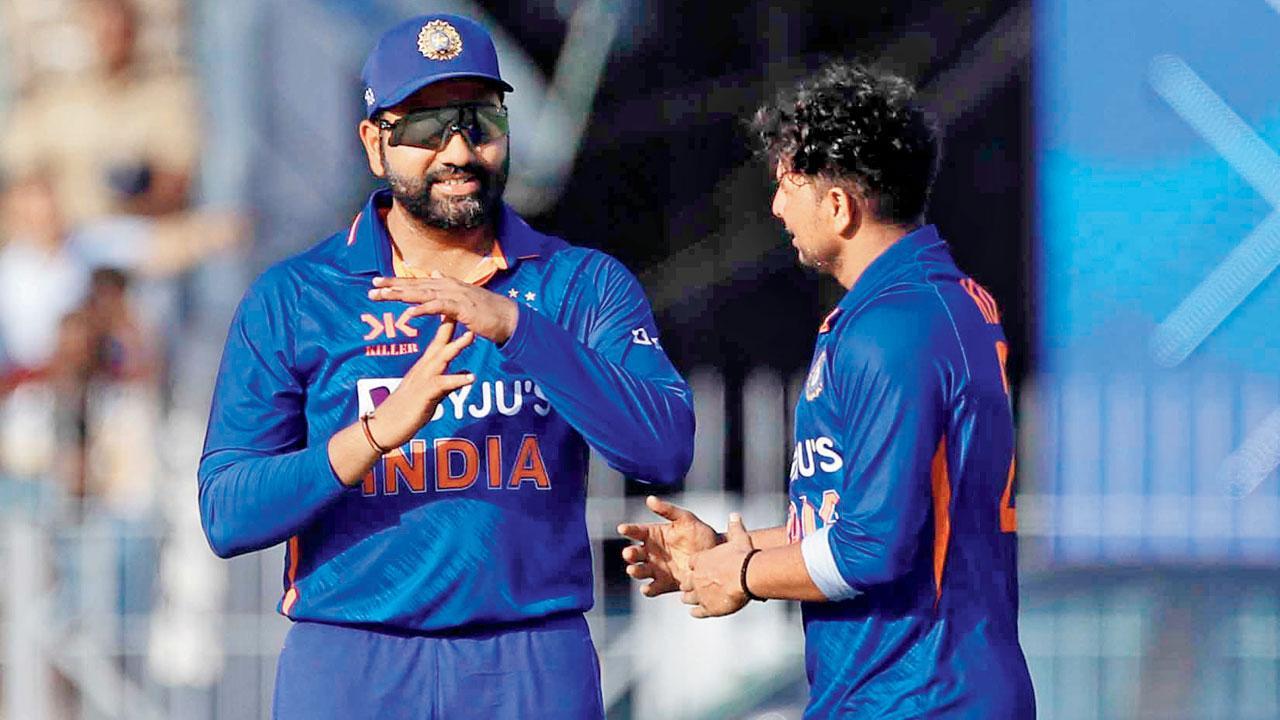Leave it to the umpires to call for video replays if they are not sure. The argument that it slows the game down is now superfluous. When Steve Smith needs a new pair of gloves after facing just nine balls and the fittest cricketers of all time need a drink every five minutes, clearly that horse has bolted

India skipper Rohit Sharma (left) asks for a review during the 3rd ODI v Oz at Chennai last month. Pic/Getty Images
 If ever there was a justification for the ICC to call for Decision Review of DRS, it must surely be after Rohit Sharma’s recent admission that “DRS is a tricky one. It’s like a lottery. If you get it right, you get it right. Otherwise, you hope for the best.”
If ever there was a justification for the ICC to call for Decision Review of DRS, it must surely be after Rohit Sharma’s recent admission that “DRS is a tricky one. It’s like a lottery. If you get it right, you get it right. Otherwise, you hope for the best.”
Surely, when DRS was first introduced, it was never the intention that it was to be used a strategic tool, much less this concession now that it has become a lottery. That is a damning indictment of just how far cricketers have strayed from the old traditions of accepting the umpire’s verdict, taking the good with the bad, it all evens out in the end… the usual cliches that the gentleman’s game was founded on.
Most sensible cricket followers would agree that if we have the technology, not infallible, but nonetheless a step forward, we should be using it to eradicate the howler, that awful mistake that umpires are occasionally prone to making. That was DRS’ genesis, the elimination of the clear inside edge for a LBW, the caught behind that missed the bat with daylight visible, the ball that hits the batsman way outside the line or the bat-pad catch where the gloves were nowhere near the ball.
If, as Rohit now admits, it has become nothing more than a lottery, surely the time has come to tweak the system. The recent Border-Gavaskar series and the ODIs that followed were an abomination in terms of the number of decisions that players got wrong. When that many referrals are ridiculously wrong, it should take away any lingering resentment that players have towards umpires. It clearly shows that despite the outrage and frustration that players show, Steve Smith at the very top of that list, they (the players) are getting it wrong far more often than the umpires. And when decisions are overturned, it’s very rarely the case that any of those decisions were howlers. They might have been marginal 60-40 calls, but was that why DRS was invented?
Rohit’s priceless reaction
Rohit’s reaction in the third ODI when Kuldeep cajoled him into asking for a DRS on a LBW was priceless. He was initially unconvinced, then reluctantly asked for DRS and even before the decision was reviewed, he was grumpy with the bowler, knowing that he had burned a review. His subsequent reaction was all the proof that the ICC needs to revisit this phenomenon. Players have surely lost the right to be indignant about poor umpiring when they themselves are making mistakes at a much higher rate than the poor umpires.
Also read: ‘Life is too short for arguments’
Umpire’s call is yet another source of visible irritation. You see players getting grumpy about umpire’s call decisions going against them, but surely if it’s that close, it’s not classed as a howler which is the raison d’etre of DRS anyway!
Maybe, we need to just leave it to the umpires to call for video replays if they’re not sure. The argument that it slows the game down is now superfluous. When Smith needs a new pair of gloves after facing just nine balls and the fittest cricketers of all time need a drink every five minutes, clearly that horse has bolted.
Over-rate issue
When was the last time a team bowled their 90 overs in six hours? The extra half-hour is almost guaranteed these days. India took almost four hours to bowl 49 overs in Chennai, despite 28 overs of spin. So what if the umpires use up a bit of time to make the right decision?
In an earlier mid-day piece, I floated the left-field idea of treating DRS like playing poker. If you want to see my hand, it’s going to cost you 10 runs. Imagine how many indignant DRS referrals (and subsequent embarrassed smiles) will be avoided if teams knew that for any DRS that wasn’t an umpire’s call at the very least, it would cost them a run penalty? Only then might we return to the original purpose of DRS—to rectify a blatantly wrong decision that happens in a game where humans have to make decisions. To err is human, to smile forgivingly when an umpire gets it wrong is humane. Because it’s clear that umpires are still getting it right more often than the prima donnas. And for goodness sake, don’t allow Mohammed Siraj or Ravindra Jadeja anywhere near the team huddle when discussing DRS!
Michael Jeh is a Brisbane-based former first-class cricketer.
 Subscribe today by clicking the link and stay updated with the latest news!" Click here!
Subscribe today by clicking the link and stay updated with the latest news!" Click here!










